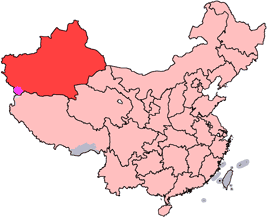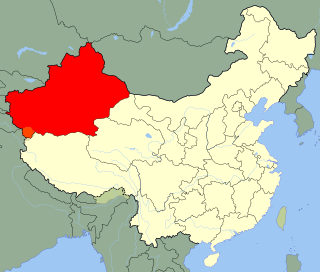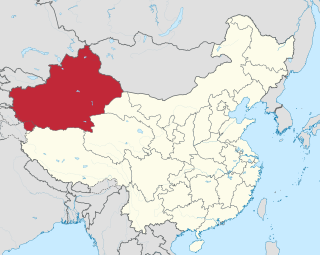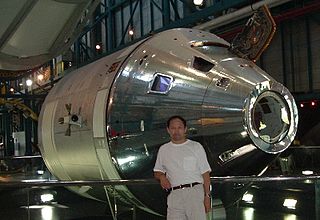Related Research Articles

Rebiya Kadeer is an ethnic Uyghur businesswoman and political activist. Born in Altay City, Xinjiang, Kadeer became a millionaire in the 1980s through her real estate holdings and ownership of a multinational conglomerate. Kadeer held various positions in the National People's Congress in Beijing and other political institutions before being arrested in 1999 for, according to Chinese state media, sending confidential internal reference reports to her husband, who worked in the United States as a pro-East Turkistan independence broadcaster. After she fled to the United States in 2005 on compassionate release, Kadeer assumed leadership positions in overseas Uyghur organizations such as the World Uyghur Congress.

The East Turkestan independence movement is a political movement that seeks the independence of East Turkestan, a large and sparsely-populated region in northwest China, as a homeland for the Uyghur people, who are primarily of Turkic rather than Sinitic ethnic extraction. The region is currently administered as a province-level subdivision of the People's Republic of China (PRC), under the official name Xinjiang Uyghur Autonomous Region (XUAR). Within the movement, there is widespread support for the region to be renamed, since "Xinjiang" is seen by independence activists as a colonial name. "East Turkestan" is the most well-known proposed name. "Uyghurstan" is another well-known proposed name.

The Uyghur American Association is a prominent Uyghur American non-profit advocacy organization based in Washington, D. C. in the United States. It was established in 1998 by a group of Uyghur overseas activists to raise the public awareness of the Uyghur people, who primarily reside in Xinjiang, China, also known as East Turkestan. The Uyghur American Association is an affiliate organization of the World Uyghur Congress and works to promote the Uyghur culture and improved human rights conditions for Uyghurs.

Nury A. Turkel is an Uyghur American attorney, public official and human rights advocate based in Washington, D.C..

The January 2007 Xinjiang raid was carried out on January 5, 2007 by the Chinese police against a suspected East Turkestan Islamic Movement (ETIM) training camp in Akto County in the Pamir plateau.
Terrorism in China refers to the use or threatened use of violence to effect political or ideological change in the People's Republic of China. The definition of terrorism differs among scholars, between international and national bodies and across time and there is no legally binding definition internationally. In the cultural setting of China, the term is relatively new and ambiguous.

The 2008 Uyghur unrest is a loose name for incidents of communal violence by Uyghur people in Hotan and Qaraqash county of Western China, with incidents in March, April, and August 2008. The protests were spurred by the death in police custody of Mutallip Hajim.

The 2008 Kashgar attack occurred on the morning of 4 August 2008 in the city of Kashgar in the Western Chinese province of Xinjiang. According to Chinese government sources, it was a terrorist attack perpetrated by two men with suspected ties to the Uyghur separatist movement. The men reportedly drove a truck into a group of approximately 70 jogging police officers, and proceeded to attack them with grenades and machetes, resulting in the death of sixteen officers. Foreign tourists who witnessed the scene provided a divergent account of events, saying that the attackers appeared to be machete-wielding paramilitary officers.

The Ghulja incident was the culmination of the Ghulja protests of 1997, a series of demonstrations in the city of Ghulja in the Xinjiang autonomous region of China (PRC) beginning in early February 1997.

The July 2009 Ürümqi riots were a series of violent riots over several days that broke out on 5 July 2009 in Ürümqi, the capital city of the Xinjiang Uyghur Autonomous Region (XUAR), in Northwestern China. The first day's rioting, which involved at least 1,000 Uyghurs, began as a protest but escalated into violent attacks that mainly targeted Han people. China's People's Armed Police were deployed and two days later hundreds of Han people clashed with both police and Uyghurs. PRC officials said that a total of 197 people died, most of whom were Hans, with 1,721 others injured and many vehicles and buildings destroyed. Many Uyghurs disappeared during wide-scale police sweeps in the days following the riots; Human Rights Watch (HRW) documented 43 cases and said figures for real disappearances were likely to be much higher.

The World Uyghur Congress is an international organization of exiled Uyghur groups that aspires to "represent the collective interest of the Uyghur people" both inside and outside of the Xinjiang Uyghur Autonomous Region of the People's Republic of China. The World Uyghur Congress describes itself as a nonviolent and peaceful movement that opposes what it considers to be the Chinese occupation of East Turkestan and advocates rejection of totalitarianism, religious intolerance and terrorism as an instrument of policy. The Congress is funded in part by the National Endowment for Democracy or NED of the United States. It has been called a terrorist organization by the Chinese government and Chinese state-controlled media.

Ilham Tohti is a Uyghur economist serving a life sentence in China, on separatism-related charges. He is a vocal advocate for the implementation of regional autonomy laws in China, was the host of Uyghur Online, a website founded in 2006 that discusses Uyghur issues, and is known for his research on Uyghur-Han relations. Ilham was summoned from his Beijing home and detained shortly after the July 2009 Ürümqi riots by the authorities because of his criticism of the Chinese government's policies toward Uyghurs in Xinjiang. Ilham was released on August 23 after international pressure and condemnation. He was arrested again in January 2014 and imprisoned after a two-day trial. For his work in the face of adversity he was awarded the PEN/Barbara Goldsmith Freedom to Write Award (2014), the Martin Ennals Award (2016), the Václav Havel Human Rights Prize (2019), and the Sakharov Prize (2019). Ilham is viewed as a moderate and believes that Xinjiang should be granted autonomy according to democratic principles.

Dolkun Isa is an Uyghur politician and activist from the region of Xinjiang Uyghur Autonomous Region of China. He is the 3rd and current president of the World Uyghur Congress, in office since 12 November 2017. He previously served as General Secretary and Chairman of the Executive Committee of the congress, respectively and has spoken on behalf of the rights of the Uyghurs which makes up the majority population in that region, as well as presented Uyghur human rights issues to the UN Human Rights Council, European Parliament, European governments and international human rights organizations.
There is a small community of Uyghurs in Pakistan, originating from the Xinjiang autonomous region of China.

The Baren Township conflict was an armed conflict that took place between Uyghur militants and Chinese government forces in April 1990. It is unclear what happened during the armed conflict because reports of the incident vary greatly.
The 2012 Yecheng attack occurred on February 28, 2012 in Yecheng, Xinjiang, a remote town on China's border with Pakistan. Details of the attack are disputed: according to Chinese government reports and court documents, at around 6 p.m. that day, a group of eight Uyghur men led by religious extremist Abudukeremu Mamuti attacked pedestrians with axes and knives on Happiness Road. Local police fought with the attackers, ultimately killing all and capturing Mamuti. State-run media reported that one police officer died and four police were injured, while 15 pedestrians died from Mamuti's assault and 14 more civilians were injured. Chinese officials characterized the event as a "terrorist attack."

The Xinjiang conflict, also known as the East Turkistan conflict, Uyghur–Chinese conflict or East Turkistan-Sino conflict, is an ongoing ethnic geopolitical conflict in what is now China's far-northwest autonomous region of Xinjiang also known as East Turkistan. It is centred around the Uyghurs, a Turkic ethnic group who constitute a plurality of the region's population.

Uyghur Americans are Americans of Uyghur ethnicity. Most Uyghurs immigrated from Xinjiang, China, to the United States from the late 1980s onwards, with a significant number arriving after July 2009.

The Xinjiang internment camps, officially called vocational education and training centers by the government of China, are internment camps operated by the government of the Xinjiang Uygur Autonomous Region and its Chinese Communist Party (CCP) provincial committee. Human Rights Watch says that they have been used to indoctrinate Uyghurs and other Muslims since 2017 as part of a "people's war on terror", a policy announced in 2014. The camps have been criticized for alleged human rights abuses, including mistreatment, rape, and torture, by the governments of many countries and human rights organizations, with some of them alleging genocide. Some 40 countries around the world have called on China to respect the human rights of the Uighur community, including countries like Canada, Germany, Turkey, Honduras and Japan. The governments of more than 35 countries have expressed support for China's government.

The Uyghur genocide is the characterization of the series of ongoing human rights abuses committed by the government of China against Uyghurs and other ethnic and religious minorities in Xinjiang as genocide. Since 2014, the Chinese government under the direction of the Chinese Communist Party (CCP) during the administration of CCP general secretary Xi Jinping has pursued policies that incarcerated more than an estimated one million Muslims in internment camps without any legal process. This is the largest-scale detention of ethnic and religious minorities since World War II. Thousands of mosques have been destroyed or damaged, and hundreds of thousands of children have been forcibly separated from their parents and sent to boarding schools.
References
- ↑ "Uyghur Rights and Writers". International PEN. 1 March 2008. Archived from the original on 2 January 2013. Retrieved 2 January 2013.
- 1 2 3 4 "Devastating Blows: Religious Repression of Uighurs in Xinjiang". Human Rights Watch. 2005. Archived from the original on 2 January 2013. Retrieved 2 January 2013.
- 1 2 维族作家亚森因言获罪狱中离世. Radio Free Asia (in Chinese). 1 January 2013. Archived from the original on 2 January 2013. Retrieved 2 January 2013.
- 1 2 3 "China: Uighur writer's death in prison bitter blow". Amnesty International. 2 January 2013. Archived from the original on 2 January 2013. Retrieved 2 January 2013.
- 1 2 3 Hamish McDonald (12 November 2005). "China battles to convince terror sceptics". The Age. Archived from the original on 2 January 2013. Retrieved 2 January 2013.
- ↑ Rebiya Kadeer (11 August 2010). "Beijing silences voices for freedom". The Australian. Archived from the original on 2 January 2013. Retrieved 2 January 2013.